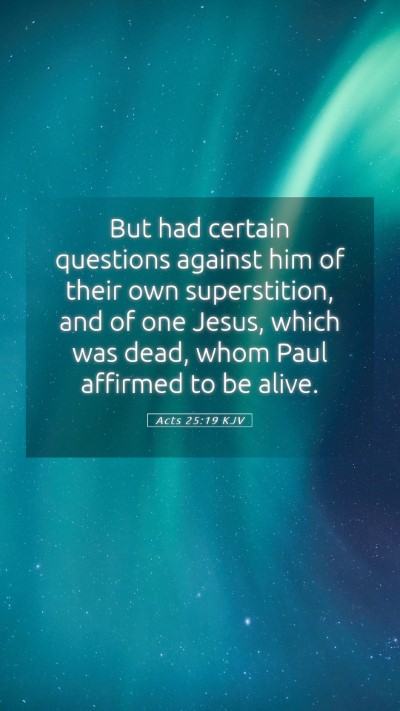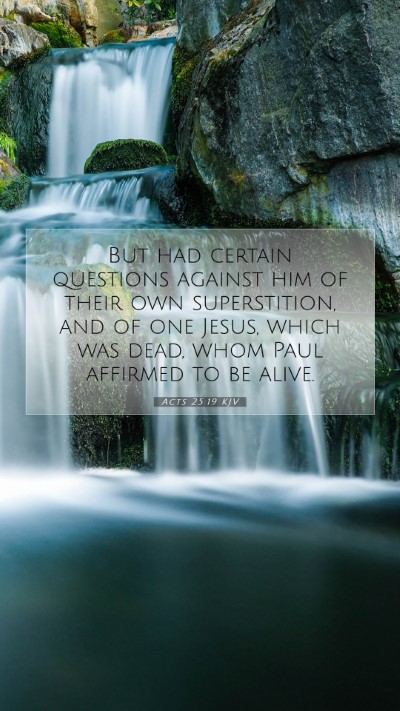Old Testament
Genesis Exodus Leviticus Numbers Deuteronomy Joshua Judges Ruth 1 Samuel 2 Samuel 1 Kings 2 Kings 1 Chronicles 2 Chronicles Ezra Nehemiah Esther Job Psalms Proverbs Ecclesiastes Song of Solomon Isaiah Jeremiah Lamentations Ezekiel Daniel Hosea Joel Amos Obadiah Jonah Micah Nahum Habakkuk Zephaniah Haggai Zechariah MalachiActs 25:19 Meaning
What is the meaning of Acts 25:19?
But had certain questions against him of their own superstition, and of one Jesus, which was dead, whom Paul affirmed to be alive.
Acts 25:19 Bible Verse Meaning
Understanding Acts 25:19: A Comprehensive Commentary
Acts 25:19 states:
"But had certain questions against him of their own superstition, and of one Jesus, which was dead, whom Paul affirmed to be alive." (Acts 25:19 KJV)
This verse occurs during a crucial moment in the Apostle Paul's journey and involves a detailed perspective on the charges brought against him. Below is an in-depth analysis combining insights from respected public domain commentaries including those by Matthew Henry, Albert Barnes, and Adam Clarke.
Contextual Overview
The apostle Paul is standing trial before Governor Festus, who is trying to ascertain the true nature of the accusations made against him by the Jewish leaders. The mention of Jesus in this verse signifies pivotal theological implications that not only bear a direct relevance to Paul's defense but also to the early Christian faith itself.
Key Themes in Acts 25:19
- The Nature of Accusations: The term "superstition" refers to the peculiar religious practices that the Jews held, many of which were seen as unorthodox or strange by the Roman authorities. This highlights the cultural tensions of the time.
- Death and Resurrection of Jesus: The conflict lies in the proclamation of Jesus' resurrection—a core belief of Christianity that Paul ardently defended.
- The Role of Paul: Paul's role as a defender of the Gospel is evident; he stands firm in his claim about Jesus, indicating the resurrection’s significance in Christian faith.
Commentary Insights
Matthew Henry's Commentary
Matthew Henry emphasizes that Paul's assertion of Jesus’ resurrection is the crux of his defense. He argues that the resurrection not only validates Jesus' ministry but is the cornerstone of Christian hope. Paul, in declaring this truth, positions himself firmly within the realms of faith rather than crime, highlighting the religious nature of the dispute.
Albert Barnes' Commentary
Albert Barnes further notes the distinction Festus must make between a judicial investigation and a theological debate. Barnes suggests that the “superstition” label reflects how outsiders viewed the faith of the Jews and early Christians, indicating a lack of understanding of the transformative message of the resurrection. He asserts that the distinction between mere superstition and true faith is crucial in biblical interpretation.
Adam Clarke's Commentary
Adam Clarke elaborates on the term "superstition," detailing its implications and how it bears witness to the early church's challenges in establishing doctrinal unity amid external pressures. Clarke highlights the dangers faced by Paul as he represents a movement based on faith in the resurrection of One who was crucified, challenging the societal norms of both Jews and Gentiles.
Biblical Exegesis of Acts 25:19
Acts 25:19 serves as an excellent example of how early Christians navigated the complexities of their faith in a hostile environment. The way Paul articulates his beliefs serves as a model for defending the truth of the Gospel. In understanding this passage, one gains insights into how to interpret Bible verses by considering immediate context, historical ramifications, and theological significance.
Application of Acts 25:19
Understanding Acts 25:19 offers valuable lessons for today’s believers:
- Standing Firm in Faith: Just as Paul stood firm despite accusations, modern believers are encouraged to uphold their beliefs amidst opposition and misunderstanding.
- The Power of Resurrection: Recognizing and affirming the resurrection of Jesus is central to the Christian message and should be integral to every believer’s testimony.
- Cultural Engagement: Engaging with cultural notions of faith as “superstition” requires a thoughtful and articulate defense that explains the evidential basis of one's beliefs.
Related Bible Verses
Acts 25:19 resonates with several other biblical passages that illuminate its themes:
- 1 Corinthians 15:14: "And if Christ be not risen, then is our preaching vain, and your faith is also vain."
- Acts 17:32: "And when they heard of the resurrection of the dead, some mocked: and others said, We will hear thee again of this matter."
- Philippians 3:10: "That I may know him, and the power of his resurrection, and the fellowship of his sufferings, being made conformable unto his death."
Conclusion
In conclusion, Acts 25:19 is a vital verse bearing profound meaning within the context of early Christian struggles and theological assertiveness. By engaging with the insights from esteemed commentaries and applying the core messages to oneself, a deeper understanding of Scripture unfolds. This enhances not only the individual's Bible study experience but also aids in sharing the insights gained with Bible study groups and communities.


